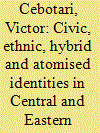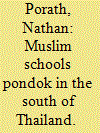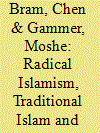|
|
|
Sort Order |
|
|
|
Items / Page
|
|
|
|
|
|
|
| Srl | Item |
| 1 |
ID:
147659


|
|
|
|
|
| Summary/Abstract |
While the topic of identity of ethnic minorities abounds in theoretical insights, most discussion is still clustered around the civic–ethnic divide while assuming conclusions with limited empirical evidence. By contrast, this article uses a four-category typology of identity that considers both in-group and out-group attachments to address hypotheses about competing identities and about factors influencing minorities to adopt one identity type over others. Based on unique data evidence of 12 ethnic minorities in Central and Eastern Europe, this study concludes that the ‘hybrid’ identity, rather than the literature-assumed ‘ethnic’ identity, tops the identification preference of minorities, although there are differences in levels and patterns when controlling for various covariates. The choice of identity depends on the socialisation process, the economic status, the perceived discrimination and intergroup tensions, reflecting variations in the system of values common to a region with complex ethnic dynamics.
|
|
|
|
|
|
|
|
|
|
|
|
|
|
|
|
| 2 |
ID:
135002


|
|
|
|
|
| Summary/Abstract |
This paper focuses on the ponoh/pondok Muslim schools of the south of Thailand. These schools, which are traditional institutions of religious learning and places of religious piety, have experienced conflict and contestations throughout the twentieth century. Pondok have been pulled by different modernizing forces including separatist violence. The paper concludes that the contestations and negotiations with the Thai government are about the development of the local Malay people's modern civic identity within Thailand. It suggests that the introduction of a secular curriculum has had (and still has) its benefits for empowering the Malay-speaking population by supplying them with the cultural tools to contest and civically negotiate their position, culture and heritage within the Kingdom. The paper also provides a history of these schools and their political relationship to the Thai government's policies and to separatist organizations, as well as an update of events relating to the schools during the recent period of separatist and counter-separatist activities.
|
|
|
|
|
|
|
|
|
|
|
|
|
|
|
|
| 3 |
ID:
121473


|
|
|
|
|
| Publication |
2013.
|
| Summary/Abstract |
This study examines the interplay between Islam and collective identity and their position in potential conflicts by exploring the dynamics of Islam, ethno-nationalism and civic society within different parts of the Northern Caucasus. Historical and anthropological approaches are used for a comparative analysis of Daghestan and Chechnya in the east and of Kabardino-Balkaria and Karachai-Cherkesia in the west. The study demonstrates the importance of local context and historical background to the understanding of ethnicity, nationalism, civic identity and their interplay with Islam. The analysis highlights that the different history and socio-cultural characteristics of the different regions in question leads to different approaches to religion which contain a paradox. In Daghestan and Chechnya, Islam is well established and the authorities have to collaborate with different Islamic bodies in their struggle against 'Wahhabism'. In Kabardino-Balkaria and Karachai-Cherkesia the 'legitimate' Islamic leaders - whether those representing the state or leaders of other Islamic movements - are powerless. While this represents the overall weak position of Islam in these areas, paradoxically it also opens options for radical Islamists to gain support, in the context of economic hardships, weakening of other sources of identification, and corruption. This process is generated and fostered by policies that limit ethno-nationalism and expand the struggle against radicalism to a struggle against religious activity in general. The Northern Caucasus has often been perceived as a major locus of radical Islam, and as a strategic rift in the 'clash of civilizations'. This study claims that the significant rifts and conflicts are between different Islamic alternatives. Important variables crucial to this discussion highlighted by the case of the Northern Caucasus are ethnicity, nationalism, civic identity and their interplay with Islam. At the same time, this case also highlights that the potential of radicalism in Islamic societies is not the mere result of its own 'characteristics', but is also a product of policy towards Islamic societies by outside actors, in this case Russia.
|
|
|
|
|
|
|
|
|
|
|
|
|
|
|
|
|
|
|
|
|